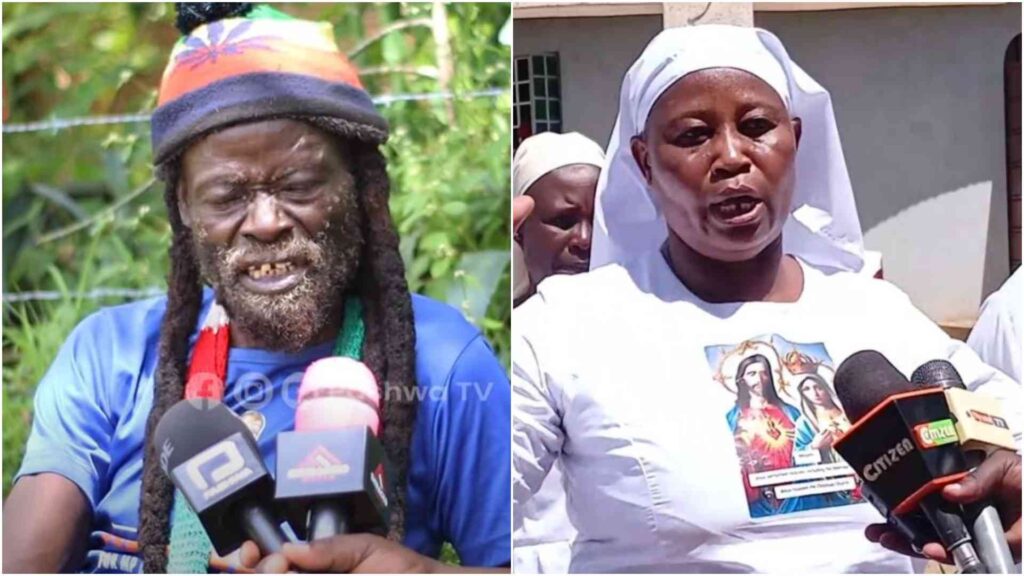A man from Shibuli, Lurambi constituency, Kakamega County, has caused a stir by proclaiming himself the “third God” and the father of Jesus Christ, just days after a woman in Busia claimed to be the Virgin Mary. Alfred Ndeta, the self-proclaimed deity, says he descended to earth in 1987 with a mission to save humankind, sparking both fascination and skepticism among locals.
Alfred Ndeta, a long-haired man often seen in a white robe, claims his divine journey began on March 10, 1987, when he received a spiritual calling while living in Nairobi. He moved to Shibuli, which he calls “heaven,” and has not bathed since, insisting this reflects his divine status. “I have no bodyguard, no servant, and I am God. Presidents and governors have security, so why don’t I, the God of nations, have any?” Ndeta asked, challenging why he lacks protection.
He claims to have banished Satan to hell on August 22, 1988, and has set up his home with a “kingdom seat” for himself, a section for the Holy Spirit, and a continuous fire for healing ailments. A cow statue, which he says reveals those with bad intentions, stands prominently in his compound. Ndeta is accompanied by young followers, whom he calls “angels,” who follow his teachings.
Shibuli residents are divided over Ndeta’s claims. Some believe in his supernatural powers, citing alleged healings and exorcisms. One villager recalled Ndeta sacrificing three sheep by a riverbank and ordering relocations, a command many followed, boosting his influence. “He has done things we can’t explain,” a supporter said.
Others dismiss him as delusional, pointing to similar claims in Kenya’s recent past, like Eliud Wekesa, known as “Yesu wa Tongaren,” and Judith Nafula, who declared herself the Virgin Mary in Busia on June 4, 2025. Nafula claimed a divine vision revealed her as Mary, with her husband, John Wekulo, supporting her as “Joseph.” The Shakahola cult tragedy, where a self-proclaimed prophet led to mass deaths, has made many wary of such figures.
Ndeta’s declaration comes shortly after Nafula’s in Busia, reflecting a trend in Western Kenya. Figures like Jehovah Wanyonyi, who claimed to be God until his death in 2015, have emerged before. Dr. Mary Kiptoo, a sociologist at Moi University, links such claims to socio-economic struggles. “In tough times, people turn to charismatic leaders for hope, but this can lead to exploitation,” she said. Kakamega police are monitoring Ndeta, though no legal action has been taken.
Ndeta’s claims have gone viral on X, with users mixing humor and concern. “First a Virgin Mary in Busia, now a ‘God’ in Kakamega who doesn’t bathe? Kenya is wild,” one post read. Another said, “Kakamega man claims he’s God, preaching in a white robe while villagers watch in shock.” The timing, so close to Nafula’s claims, has fueled online debates about the credibility of such figures.
Ndeta has asked the Kenyan government for financial support to complete his “heaven” in Shibuli, arguing his divine mission needs resources. This request has sparked controversy, with critics questioning the use of public funds. “He wants money and security as ‘God’? That’s absurd,” a local resident said.
As Ndeta preaches in his white robe, drawing crowds of curious onlookers and devoted followers, Shibuli remains a hotspot of debate. His claims, alongside Nafula’s in Busia, highlight Kenya’s complex religious landscape, where faith and skepticism collide. Whether Ndeta is a divine figure or a misguided individual, his story underscores the need for caution in the face of bold spiritual claims.
